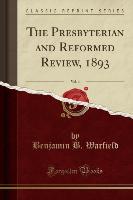- Start
- The Presbyterian and Reformed Review, 1893, Vol. 4 (Classic Reprint)
The Presbyterian and Reformed Review, 1893, Vol. 4 (Classic Reprint)
Angebote / Angebote:
Excerpt from The Presbyterian and Reformed Review, 1893, Vol. 4
In the Romans there are about seventythree quotations and allu sions of all kinds. Of these, twenty-seven are exact citations and twenty practically so. Only eight could be called loose, eight are mere allusions, two are centos of scattered passages grouped for a purpose. In four cases we may observe apparently intentional changes of verbiage to make the bearing of the truth more evident. Seven times (i. 17, ix. 1, 7, 32, x. 15, xi. 4, 34, xii. 19) he differs from the Septuagint, and corresponds more closely to Hebrew. In six instances (iii. 4, 14, ix. 32, x. 11, xii. 19, xv. 12) he follows the Septuagint where it differs from the Hebrew, but in none of these cases does the sense of Scripture suffer. Once (xi. 26) he differs in a single word from both Hebrew and Septuagint, saying, Out of Sion shall come the deliverer, instead of To or for Sion, but here he apparently mingled a reminiscence of one of the Psalms with the language of Isaiah.
It would be tedious for me to give more details. I believe these to be fair specimens of the proportion of exact and inexact quota tions in Paul's epistles as well as of his methods. The key to what ever difi'iculty remains is found in the fact, which should never be for gotten, that Paul combined and meant to combine in his use of Scrip ture the functions of both an appellant and an interpreter. He is ever bent on letting the light of the gospel on the Scripture, as well as on supporting the gospel by the Scripture. He never pretended that he had derived his doctrine from the Scripture. He always claimed that he had derived it by revelation from Jesus Christ. Then, however, he saw the meaning of Scripture, and could both appeal to it and explain it. His exegetical method therefore was determined by his practical purpose. He had no need, as we have, first to state the grammatico-historical sense of the passage quoted, and then elaborately to show the principle on which it could be applied to the case in hand. When quoting, he often is interpreting. Hence some of his striking combinations of passages. Hence his change of its phraseology when occasion required. Hence his attitude now of reverence for its letter, and now of appar ent disregard of its letter and attention solely to its essential mean. Ing. When all these facts are duly considered, there appears noth ing in Paul's actual use of Scripture which can be fairly made to contradict his expressed doctrine.
About the Publisher
Forgotten Books publishes hundreds of thousands of rare and classic books. Find more at www.forgottenbooks.com
This book is a reproduction of an important historical work. Forgotten Books uses state-of-the-art technology to digitally reconstruct the work, preserving the original format whilst repairing imperfections present in the aged copy. In rare cases, an imperfection in the original, such as a blemish or missing page, may be replicated in our edition. We do, however, repair the vast majority of imperfections successfully, any imperfections that remain are intentionally left to preserve the state of such historical works.
Folgt in ca. 5 Arbeitstagen
